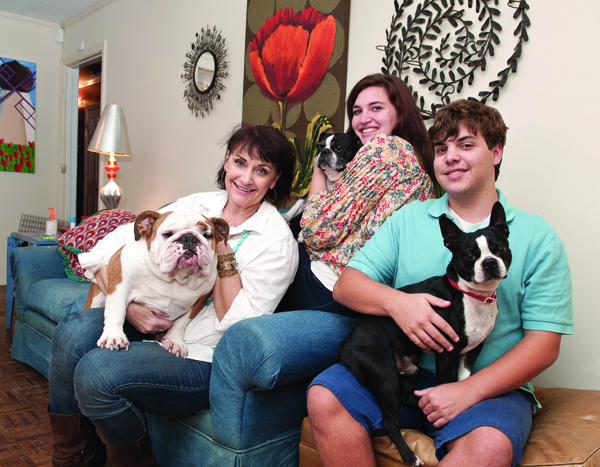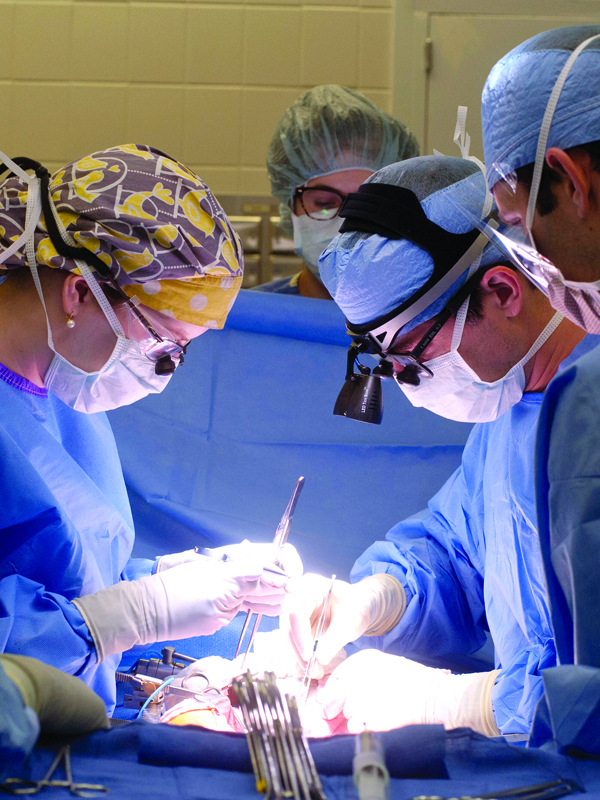Practice Rounds: A first in the state: With pancreas transplant, patient takes heart

Ask Nancy Smith why she opted for a pancreas transplant, and she'll tell you about her heart.
There's her son Carruth, 18, a high school senior. There's daughter Braeden, 23, a college graduate and preschool teacher.
"They're amazing," the Jackson resident says of her children. Carruth copes with the challenges of Asperger's syndrome, a form of autism, and a rare neuropsychiatric disorder associated with strep infections.
For them, Smith, a brittle diabetic, opted for a rare procedure not without risk or potentially devastating complications.
"He needs me, and so does she," she said. "Nobody is like a mama."
On Sept. 30, Smith became the first person in the state to receive an isolated pancreas transplant at the University of Mississippi Medical Center - not the more medically common combination of a pancreas and kidney.
"It's an incredibly rare procedure," said Dr. Mark Earl, an assistant professor of surgery at UMMC, who performed the transplant.
"It's especially rare for someone who has no kidney failure, but has other life-threatening complications from type 1 diabetes."

And, he said, the surgery marked the 10th transplant of a pancreas at UMMC in 2014, putting its transplant program on par with other acclaimed programs in the Southeast.
Diagnosed with juvenile diabetes, Smith, 52, said she and her doctors knew it would be a matter of time before she’d need a transplant. She lost sight in one eye. Her neuropathy was worsening.
Because Smith’s pancreas wasn’t producing the hormone insulin, her blood sugar level was unpredictable and would drop without warning, causing her to pass out.
“You pass out, and if it doesn’t come back up, you can die,” Earl said. “Because Nancy is a Type 1 diabetic, the insulin-producing cells in her pancreas had been killed by her own immune system.”
During a three-hour operation, Earl left her native pancreas alone; it worked well except for that one potentially fatal flaw. The donated pancreas he positioned into her abdomen produces crucial insulin, which stimulates cells to absorb sugar from the blood.
Before the surgery, Smith had tried to do all the right things: Frequently exercise. Watch her diet and weight. Pray. Try not to fret about the future.
But as her health continued to deteriorate, Smith in July 2013 secured a place on the transplant waiting list at Ochsner Medical Center in New Orleans. It was right before UMMC’s transplant program began performing pancreas-kidney procedures.
“They had to take me off the waiting list at Ochsner because I couldn’t find anyone who could go to New Orleans and stay there three months with me,” Smith said.
The timing could not have been better.
“It was ironic,” said Smith’s sister-in-law, Terri Gillespie of Jackson, UMMC’s chief nursing executive officer. “She came over to the house and said she wished UMMC would get approval for a pancreas transplant. I said, ‘Oh, my gosh. That happened yesterday.’”
Smith met with Dr. Kenneth Kokko, an associate professor of nephrology and member of UMMC’s transplant team. “Dr. Earl came in, and he said, ‘You’re going to be the first person to receive a pancreas transplant, and if there was any person who needed a pancreas transplant, you’re it,’” Smith said.
About eight months later, on Sept. 24, Earl called her: A donor pancreas had been located. She grabbed the bag that had been packed for months and headed to UMMC, only to find out that the pancreas wasn’t viable for transplant.
“We got back into the car, and Nancy said, ‘I feel like I had Braxton-Hicks contractions and I went to the hospital to have a baby, and I got sent back home,’” said her sister, Janie Robbins of Ridgeland.
“Carruth was so sad when I came back home,” Smith said. “He didn’t say a word. He just put his head on my shoulder. Braeden was bummed, but positive that all things happen for a reason.”
Just days later, Earl summoned Smith again with news of a potential pancreas. She hurried back to UMMC, donned a hospital gown, and counted down the hours before surgery in a patient room, Gillespie and Robbins at her side.
There would be a 30 percent chance she’d have to go back into surgery the first week. There was a 10 percent chance the blood supply to the new pancreas could become blocked during the first six weeks.
“There’s about a 20 percent chance of rejection, but in the overwhelming majority of folks, the transplanted pancreas lasts a long time and they are done taking insulin injections,” Earl told her.
“I’m the overwhelming majority!” Smith told him.
As Smith, Gillespie and Robbins waited for word from Earl on the pancreas’ viability, they shared a laugh over memories of Smith owning a cupcake store in the face of diabetes. And, they somberly contemplated the fact that because someone died, Smith could have a better and longer life.
“If I can just have five more years ….” Smith said, willing back her tears. “I just need a little more time.”
Earl sent Smith home just five days after she got her new pancreas.
“Everything’s a miracle,” said Smith, who wants to help people understand the importance of organ donation. “When I woke up from surgery, I didn’t have diabetes.
“I cannot imagine having anyone else in charge,” she said of Earl. “He has given me quality of life back.”
As Smith’s recovery continues, Earl said, so does her prospect of a long and healthy life.
“I want her to get 20 more years completely free of diabetes. My hope is that she goes on to die of something else as a very old lady.”


